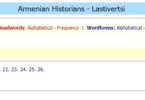Narek & Shakespeare:
Messengers of Reawakening
Prepared Remarks of Dean Thomas Samuelian, College of Humanities and Social Sciences for the Plenary Session of the
Shakespeare 400 Conference: The Enigma of Endurance
American University of Armenia, October 3, 2016
Today we are once again gathered to celebrate one of the great figures in world literature, Shakespeare, which is fitting to do at the American University of Armenia, where the language of instruction is English, the medium in which the great poet crafted his works. At the same time, we are a university in Armenia, so we inescapably see things in Armenian context, and in that context, the towering figure of verbal art is St. Gregory of Narek, the harbinger of the Armenian silver-age renaissance. Both are well known and revered by Armenian readers. Indeed, Armenia may be one of the few places in the world where one encounters Hamlets and Ophelias off the stage.
Since 2015, when Narek was named a doctor of the Universal Church by Pope Francis, his work is becoming better known around the world, not only for its theological content, but also for its verbal art, largely in translation. Presciently, Narek humbly contemplated this more than 1000 years ago, in his monastic cell on the south shore of Lake Van, now in ruins, writing that he was composing a prayer book “for all thinking people the world over expressing all human emotions and serving with its images as an encyclopedic companion to our human condition, for the entire, mixed congregation of the Church universal.” (Prayer 3b)
The theme of this conference, “the enigma of endurance” applies to both as well. Along with the Bible, the Narek is one of the earliest and most published books in Armenian much as Shakespeare is in English.
In St. Gregory of Narek and Shakespeare we encounter two authors that created verbal mirrors on the human condition, prompting us to reflect on ourselves and our world. Where Narek used a monologue with our Creator to set off an inner dialog with our conscience, Shakespeare used an outer dialogue with the audience and society to awaken us. Both aimed to change our perception of who we are and how we live, how we treat each other, through word-pictures, understanding that though they were making marks on a page, they were actually creating a score for vocalization, the music of their poetry inseparably fused with its meaning.
Ձայն հառաչանաց հեծութեան ողբոց սրտից աղաղակի
քեզ վերընծայեմ, տեսողդ գաղտնեաց,
Եւ մատուցեալ եդեալ ի հուր թախծութեան անձին տոչորման
զպտուղ ըղձից ճենճեռոյ սասանեալ մտացս`
բուրվառաւ կամացս առաքել առ քեզ:
The voice of a sighing heart, its sobs and mournful cries,
I offer up to you, O Seer of Secrets,
placing the fruits of my wavering mind
as a savory sacrifice on the fire of my grieving soul
to be delivered to you in the censer of my will. (Prayer 1)
Answering the Prophet Micah’s question: “With what shall I come before the Lord? Shall I come with burnt offerings?” (Mic. 6:6) St. Gregory gives the Psalmist’s response: “The sacrifice pleasing to God is the broken and contrite heart.” (Ps. 51) Thus, he fashions an offering of words giving voice to the contrite heart for the bem, Greek βήμα, a word used in Armenian for both altar and stage.
Like Shakepeare’s works, Narek’s prayers are each an attempt, an essay, fixing in words the dynamic essence of a situation, feeling, emotional state, thought, for which ordinary prose is insufficient. Who has not experienced the wondering, wandering mind in prayer, seeking to concentrate yet prone to distraction? Hence the rich texture of expression, the mantra-like entrancing repetitions and juxtapositions, the use of multiple, layered metaphors and images, to help focus the listeners’/readers’ attention, each speaking to different people at different times.
The study of our inner world and the audacity to survey and set out metes and bounds on its landscape is another of the marks of renaissance, the realization that we can, we must try to understand ourselves, stretching our minds and the verbal tools of our culture to do so. Each such attempt is a noble witness to our yearning for the Ineffable, which reminds us of the majesty of the quest and the awe required to approach it.
For Narek, the monk, in the 10th century on the south shore of Lake Van, it was an endeavor fraught with peril and trepidation, but nevertheless a quest compelled by the need to speak, to give voice to concerns of thinking people and for thinking people, about the perplexities of life. It also had a tragic tenor, helping people to stand outside themselves and observe from a distance what we have wrought in the paradise we have inherited. His is a penitential stance, a jolt to the heady spirit of the times. These were prosperous years, prior to the Turkic and Mongol invasions from the east, when Armenia boasted a large kingdom, successfully liberated from Arab rule, with its capital Ani, the city of a 1000 churches, with a population of 100,000, the largest city for hundreds of miles. It stood toe-to-toe and went head-to-head with the neighboring kingdoms and empires, with its superior architectural technologies in stonemasonry, strong military, and ambitious, multicultural ruling class that reached the heights of the Byzantine throne. It was in such times that Narek put things into perspective.
Like Shakespeare in the heady period of Elizabethan England, Narek perceives how precarious and ephemeral are human triumphs. Each, it seems, composed wake up calls and antidotes for those who had eyes to see and the will to understand. Yet, warnings go unheeded, good words ignored, the opportunity to turn back from foolish ways slip away and tragedy ensues. Both societies witnessed decades of turmoil after these authors’ deaths. For the Armenians and probably for the rest of the world, a turning point was imminent, with the Battle of Manzikert, in 1071, an event that fundamentally changed the shape and direction of Armenian and European history to this day, no less than the English Civil War and Glorious Revolution in England.
Not coincidentally, Gregory means “awake, vigilant.” Narek and Shakespeare exemplify, if they do not explicitly state, that it is the role of writing and writers to awaken us from stupor, this listlessness, hubris and carelessness that are an enduring part of our human constitution. And once these works have acted on our minds and hearts, most people irreversibly experience life in a new way with a new awareness of who we are and how we should live. Indeed, this may be a clue to the enigma of their endurance as part of global cultural heritage.
I wish you fruitful deliberations on this last day of this conference, which has enriched our university and community with new insights and new colleagues from around the world. We thank especially Jasmine Seymour and the Armenian Shakespeare Association for their dedication to these scholarly pursuits and their commitment to the long and rich legacy of Shakespeare as a part of Armenian cultural and literary life.







